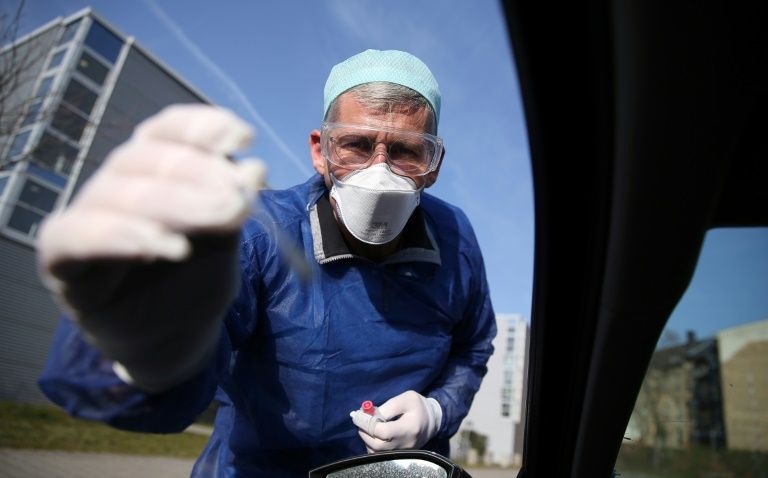 |
German doctor Michael Grosse takes a sample from a car driver at a drive-through testing point for the coronavirus in Halle, eastern Germany (AFP) |
With a total of 389 deaths out of more than 52,000 cases, Germany has a mortality rate of just 0.7 percent -- compared with around 10 percent in hardest-hit Italy and eight percent in Spain.
But German Health Minister Jens Spahn has warned that the country could face "a storm" of new cases in the weeks ahead.
The RKI's Wieler warned that the dramatic scenes at Italian hospitals at breaking point could happen in Germany as well.
"We can't rule out that we will have more patients than ventilators here too," he said.
With 25,000 intensive care beds equipped with ventilators, Germany is in a better position than many countries to deal with an influx of patients in respiratory distress.
But years of underfunding have left the country's healthcare system woefully understaffed.
"In recent months, some intensive care beds have had to be put out of action because of a lack of staff," said Reinhard Busse, a specialist in health economics at the Technical University of Berlin.
Germany currently has some 17,000 unfilled vacancies in nursing care.
As a result, many hospitals have resorted to drafting in retired health professionals or student medics to help with the expected coronavirus onslaught, including at Berlin's renowned Charite university hospital.
Polish workers
"Even before the coronavirus crisis, operations had to be cancelled because of a lack of staff," Uwe Luebking, head of labour market policies at the German Association of Towns and Municipalities, told AFP.
And when there is personnel on hand, nurses can spend up to four hours a day doing paperwork as Germany continues to lag behind other nations in digitalising administrative tasks, experts say.
To make matters worse, confinement measures and border checks brought in to stem the virus spread have made it harder for foreign workers to travel to their German workplaces, with healthcare institutions on the frontier with Poland particularly affected.
Critics have also argued that the German health system, which pays hospitals a fixed price per surgery, has led many hospitals to focus on the more lucrative practice of offering scheduled surgeries like hip or knee replacements, at the expense of strengthening their emergency care facilities.
Although Spahn has urged the directors of some 2,000 hospitals and clinics to cancel all non-urgent surgeries, several are resisting the call, according to Der Spiegel weekly. (AFP)






![[Today’s K-pop] Blackpink’s Jennie, Lisa invited to Coachella as solo acts](http://res.heraldm.com/phpwas/restmb_idxmake.php?idx=644&simg=/content/image/2024/11/21/20241121050099_0.jpg)
